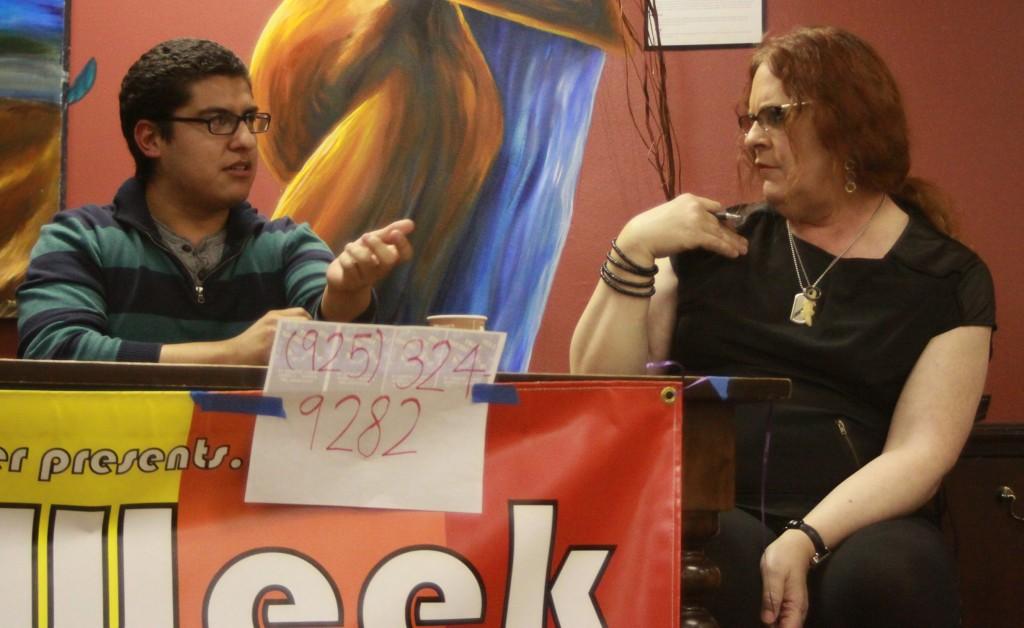
Student Jose Mendoza and Chico community member Danielle Koss explain the term “erasure” used in the LGBTQ groups and how often times bisexuality is denied as an orientation because others speculate one can only be gay or straight. The “What Does Queer Mean To You?” panel was the first event of Queer Week at the CCLC on Monday night.
Members of the LGBTQ+ community presented a panel discussion in the Cross Cultural Leadership Center as part of Queer Week at Chico State Monday evening.
The talk was coordinated by the Gender and Sexuality Equity Center and Associated Students LGBQT+ program. Panelists were joined by a crowd of students and community activists.
“The panel allows students to hear voices that are typical not heard or are silenced,” said Sarena Kirk, the LGBTQ+ program coordinator. “It includes voices from marginalized communities, people that aren’t represented in the faculty and staff, or those that aren’t represented in the media.”
“What does queer mean to you?” was the overarching theme of the discussion, was presented as the first question in the debate.
“It’s a contrast to heteronormativity,” said business and marketing major Audrey Nelepovitz, agreeing with much of the group that the word “queer” should be used as an umbrella term for individuals who do not identify with the binary gender classifications that are deemed “normal” by society.
Katelyn Alvarez, a freshman pre-nursing major, expressed the importance of reclaiming language that is historically derogatory in order to create a positive association with the word.
“Queer” used as an umbrella term also helps to mend negative divisions, a growing problem within different groups that identify within LGBTQ+, said Danielle Koss, a community activist.
Krystal Tonga, a public administration graduate student, didn’t agree with the word use.
“I don’t believe a word can be reclaimed,” Tonga said, arguing that redefining “queer” would trivialize the historical struggles of activists who experienced verbal discrimination with the identifier.
“Identity politics” are prevalent within LGBTQ+ culture, where labels are frequently defined and debated in order to describe an individual’s characteristics, Koss said.
“Grizzly bear”, an example used by Tonga, can be used to identify a non-heteronormative individual who is attracted to people with lots of hair.
Jose Mendoza, senior psychology major, said he always called himself gay when defining his orientation.
Alvarez said she avoids using lesbian as her identifier because the word is often sexualized.
Transitioning from a discussion of labels, the group talked about experiences with identity clashes.
Nelepovitz described her challenges studying business and marketing, a primarily heteronormative major.
At one point, members of her business fraternity began referring to her as “Audrey who likes girls,” she said.
Mendoza, who was raised in a machista, or hyper-masculine, Mexican culture, recounted telling his family about his homosexuality. Wanting to play it safe, he told them first that he was bisexual. His mother told him that bisexuality didn’t exist, and that he had to identify with one or the other.
Koss argued that the panelists’ experiences weren’t necessarily internally created conflicts. Instead, they were created by outside sources and internalized from the expressed views of others.
The discussion concluded with questions from the audience.
“It really dug into the heart of the issues, like we wanted it to,” Kirk said afterward.
A Pride March will be held on campus on Friday starting in Trinity Commons, to celebrate National Coming Out Day.
Mozes Zarate can be reached at [email protected].








